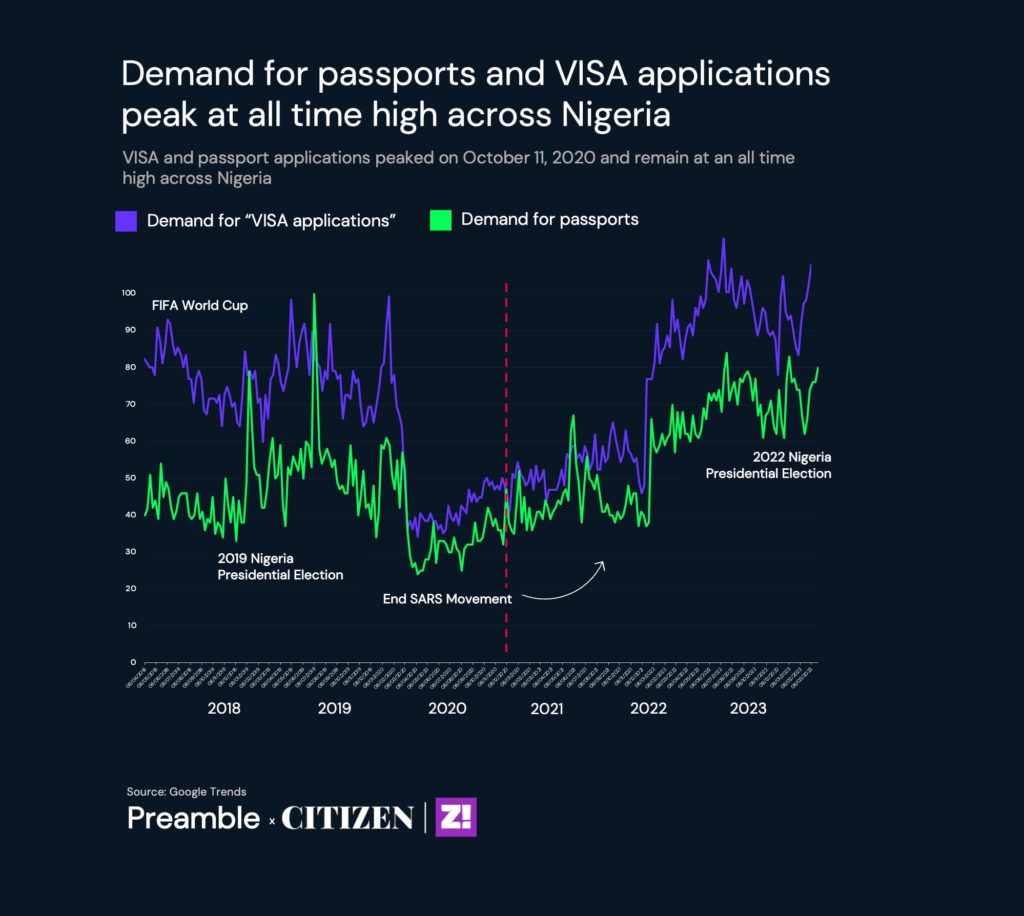
The image you’re looking at is a graph showing Google trend data between 2018 and 2023. Specifically, it focuses on how often Nigerians search online for passport and visa applications. Preamble, Citizen’s partner, provided the data. Over the next few weeks, we’ll use similar search trends to draw up infographics and explain the reasons for migration trends across Africa.
Passport and visa applications first spiked around June 2018, at the commencement of the 2018 FIFA World Cup, a major sporting activity.
Domestically, some political events also stood out, such as Amnesty International blaming the FG for increased wanton killings across the country. This happened during a herder-farmer clash that saw 200 people killed in Plateau state.
Between December 2018 and January 2019, there was another increase in demand for visas and passports. January was the month before the 2019 presidential election, with many Nigerians planning to leave the country in the aftermath.
The big story in that month was the suspension of the Chief Justice of Nigeria, Walter Onnoghen, which many Nigerians criticised for its timing and as a brazen attack on the judiciary, especially on the eve of a controversial presidential election.
Between April and July 2019, renewed interest in visa applications was noticeable. This was a transition period as the Buhari administration was getting set to begin a second term in office amid protestations against the election outcome at the court by opposition challenger Atiku Abubakar of the PDP. Buhari was sworn in on May 29, and between then and July, there was a rise in the search for visas and passports.
COVID-19’s impact on travelling
In January 2020, demand for passports spiked again, although a similar spike did not match this in visa applications. By March 2020, the search for both visas and passports cooled off sharply, which can be attributed to COVID-19 and increased lockdown and travel restrictions across the globe.
ALSO READ: Can Your Nigerian Passport Support Your Japa Plans?
According to reports, the Nigerian Immigration Service (NIS) issued 9.31 million passports between 2015 and 2022. In 2019, 1,242,953 were issued. That figure dropped significantly by 37% to 780,047 in 2020, the lowest within the period. Because of COVID-19, international flights in Nigeria were primarily suspended between March and September 2020 when they resumed.
Between April 2020 and June 2021, there was a slow but steady rise in interest in passports and visa searches. The events of October 2020 can explain part of it, the EndSARS protests. However, travel wasn’t quite as robust as already demonstrated by the COVID-19 lockdowns and restrictions.
Things began to pick up by December 2021, and interest in visas and passport applications surpassed the pre-COVID era. Explanations for this include worsening macroeconomic indicators like forex depletion, naira depreciation, government debt and high youth unemployment.
July 2022 marked peak interest in visa and passport searches on Google over the five years between 2018 and 2023. At this point, political parties had concluded their primaries. The leading contenders in the presidential race ahead of the 2023 election had emerged. The World Bank announced that Nigeria was suffering badly from inflation. Globally, it was among the worst-performing countries.
The NIS said it issued and processed 1,056,422 passports in 2021. That figure jumped to 1,899,683 in 2022 — a 55% increase from the previous year and the highest in the Buhari era. Based on the data, the high demand for passports and visas looks likely to continue.




